The Decline of Aberavon Beach
Where have all the flowers gone?
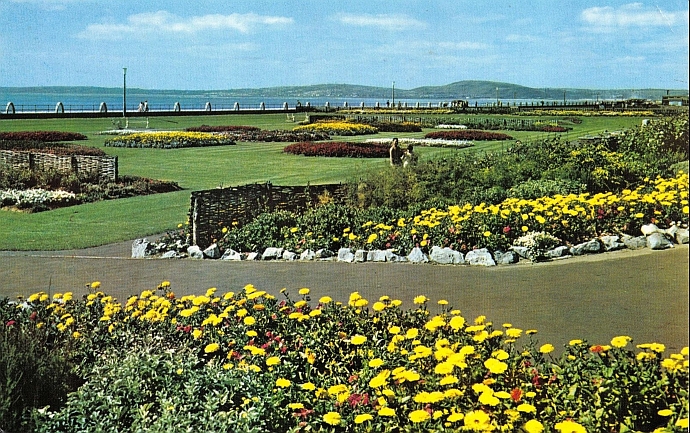 Aberavon beach sunken gardens c1967 looking west
Aberavon beach sunken gardens c1967 looking west
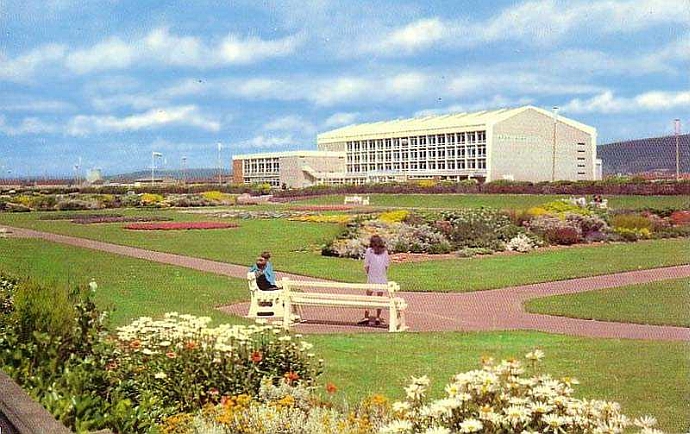 Afan Lido 1960s
Afan Lido 1960s
In the 1960s Aberavon seafront was very attractive. The local council put a lot of effort into attracting day tourists. I don't know how many gardeners they employed but this expense would have been recouped by all the money spent by the tourists. The gardens, the long sandy beach and a view across Swansea Bay, which in the minds of some of the less travelled visitors rivalled the Bay of Naples, all went together to make Aberavon beach the place to be on a sunny day.
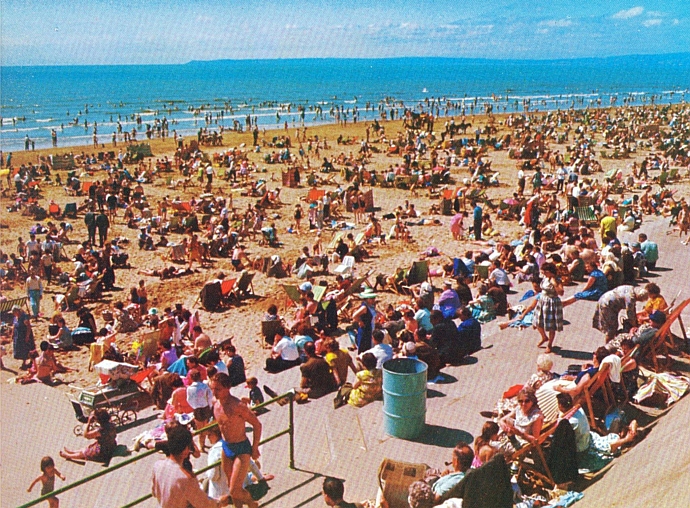 Aberavon beach in the 1960s
Aberavon beach in the 1960s
The new sunken gardens on the seafront seem to consist of random wooden structures, pebbles and large mounds of earth which now block the sea views. These "improvements" together with new buildings and a piece of conceptual art, which like all conceptual art should have remained a concept in someone's disordered brain, just makes the seafront cluttered and ugly.
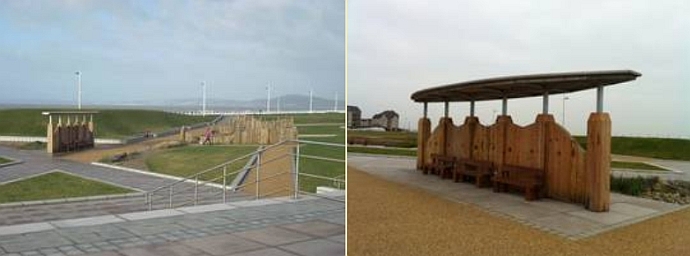
The new sunken gardens 2015
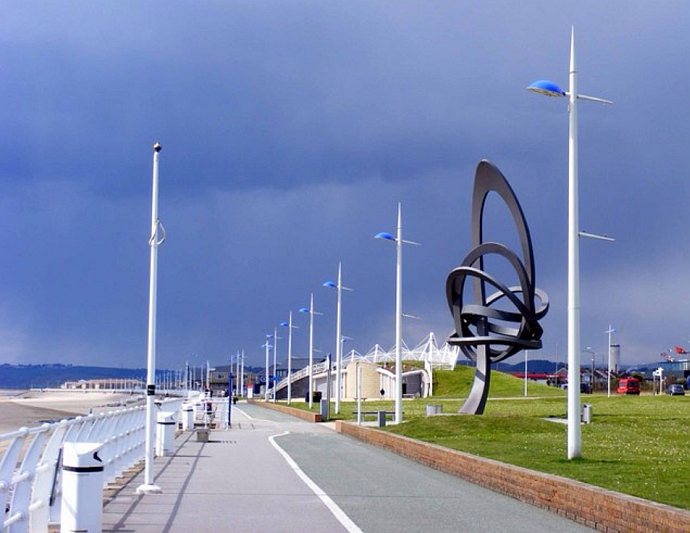
Sculpture on the promenade
Some of the sunken gardens have been replaced by houses and flats. The three windowed white house to the right of the green gasometer in the following 1960s picture can be seen on the far left of the 2016 picture.
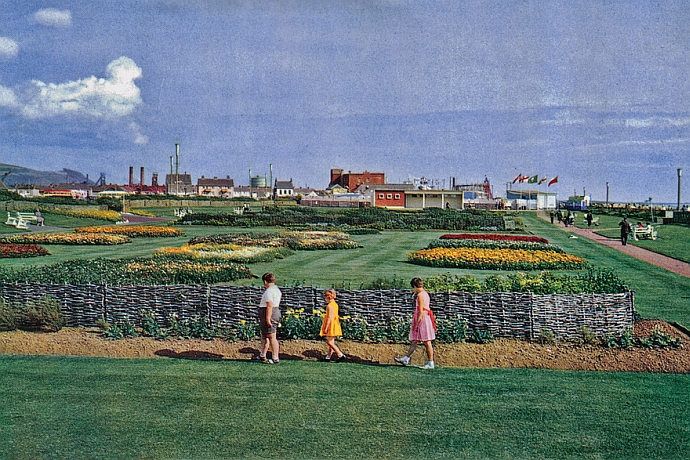
Aberavon beach looking east 1960s

Very large lump of whale shaped concrete and Jersey Quays 2016
The concrete whale has replaced the flowers because it is vandal-proof. The same could be said of the new sunken gardens. Pebbles, solidly build structures and concrete paths only tempt the most bored and determined vandals. Flowers, on the other hand, excite them into a frenzy of destruction.
Selling the sunken gardens for private housing solves the vandalism problem for the council. It also turns an expense into to an income source. The new homeowners have their own private views of beautiful sunsets. It is a win for them and it is a win for the council. Everyone seems to win except the general public. They will now see washing lines and brick walls instead of flowers and the sea.
Eventually all the sunken gardens will be replaced by housing. Everyone wants a sea view and the council will be unable to resist selling such a economically valuable asset.
Old people who remembered the area when it was all dunes will find the previously expansive views across the bay blocked by buildings. The map below shows that the dunes stretched three miles along the coast and more than half a mile inland. They were only flattened and built on in the 1950s.
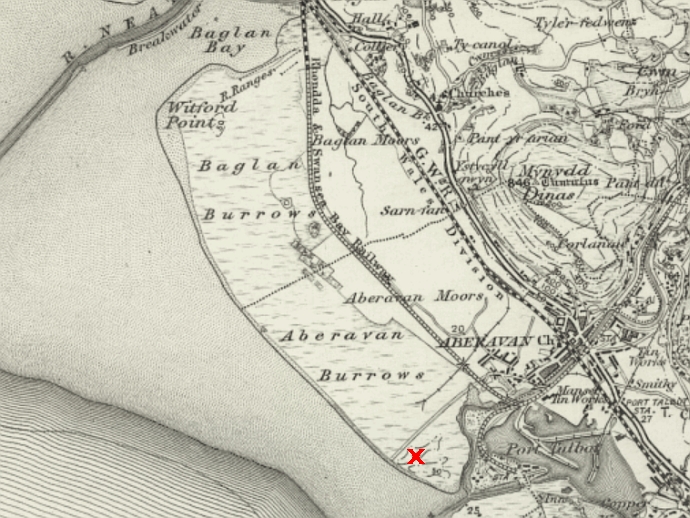
Aberavon beach and Sandfields c1900
The photo below was probably taken in the 1940s from the point marked X on the map above from a dune overlooking Victoria Road.
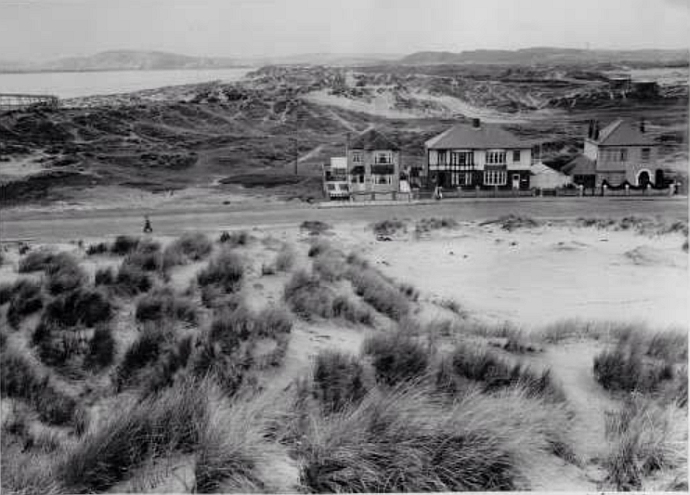
Aberavon dunes 1940s
This aerial photo shows the Sandfields Estate when it was half built. The X mark viewpoint on the map would be on the bottom left of the aerial photo. Vivian Park can be seen in the centre of the picture. The small buildings to the left and below the park are prefabs. They were supposed to be a temporary measure but I think some of them are still there.
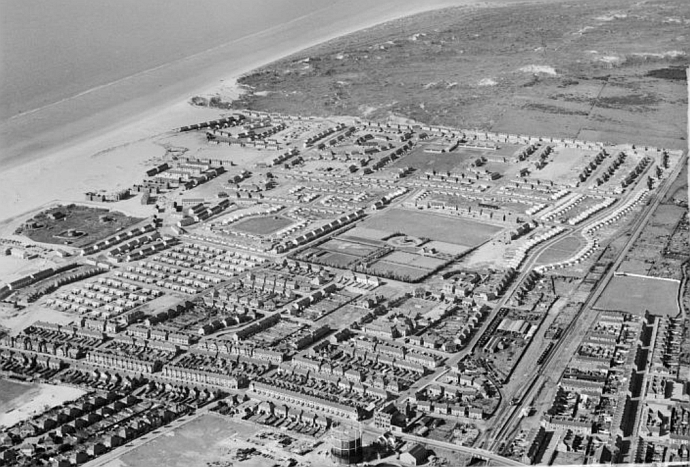
Sandfields Estate c1960
Living on the Sandfields Estate
The Sandfields Estate, which was built on the flattened dunes, was a socialist paradise. We had modern three bedroomed council houses, new schools, a health centre, a library, parks and an Olympic sized swimming pool. The nearby steelworks provided a job for anyone who wanted one. In the 1960s living in Sandfields was like having two extra parents - the council and the steelworks. For many kids the highlight of the year was the children's Christmas party at the steelworks. On top of all this we had a fun fair and a beautiful beach just a few streets way. In the 1960s the front gardens were all unwalled lawns maintained by the council. This made the place look very clean and open. As a ten year old strolling down my street towards the beach on a lovely sunny Sunday afternoon I can remember looking around and saying to myself that this was a great place to live.
But that was how it looked through a child's eyes. In fact, things were not as rosy as they seemed and our "extra parents" turned out not to be so benign and supportive as I originally thought. Perhaps, like most parents, they started off with a lot of energy and good intentions but then they became like those abusive or negligent parents who take drugs or who became too old and feeble to look after children properly. On the Sandfields Estate unemployment became the norm and Sandfields ended up being one of the most polluted spots in the UK.
People had been enticed into Sandfields from all over Wales and the UK by the prospect of well paid work and a nice council house. It seemed a great place to plant a family. But when the jobs went it looked to many as if their crops had been planted on barren polluted land. Some of this decline can only be blamed on decisions made on a national level but the local and county councils must take some responsibility for allowing a motorway to be smashed through the centre of the town and for failing to control pollution levels. Sandfields residents had the sea on one side but on the other sides they had three major sources of pollution - the steelworks, BP Chemicals and the M4 motorway.
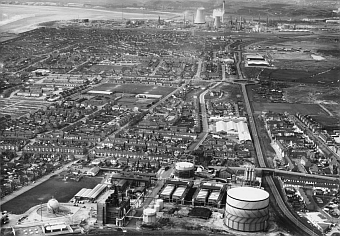 Sandfields with BP Chemicals in the distance c1970
Sandfields with BP Chemicals in the distance c1970
Ken - a boy of great promise
Ken was my best friend, but Ken was a popular boy and lot of other boys also thought he was their best friend. Although we went to the same schools he was brighter than me and he was in the class for clever kids. The comprehensive system had just come in but our teachers were under no illusions about who were the most able students. Even in primary school the children who were seen as "university material" were put in the same class. When I was about eight when this grading started. All the children were assembled in the playground and our names and classes were called out. I felt very disappointed when I was separated from Ken and other friends who were in the more intelligent group.
I've never had a problem with people being classified by their intelligence. In my life I've met many very high IQ types and it was obvious to me that their problem solving ability is on a different level to mine. They can just spot how things are related faster than the average person. I don't know exactly how bright Ken was but when we were fixing a bike or assembling a toy together I would take a back seat because I could see that he always had a better idea than me about which part went where.
Despite being in separate classes Ken and I continued to meet at other times. Our school meals were particularly horrible and I can remember going out sometimes with Ken to eat instead in town centre cafes. This was when we were still at junior school which just shows how much more freedom and responsibility children were given in those days.
Leaving Sandfields
We left Aberavon when I finished my first year of secondary school. This was before Sandfields went downhill. For me the move was a giant step backward. We went from a nice house by the seaside to a terraced house in the shadow of too many other terraced houses in a gloomy English industrial city. A surprising proportion of these householders still had outside toilets. In terms of quality of life they were decades behind the Sandfields council tenants.
Over the years I moved to many places around the UK but I always thought of Aberavon as my home town. Every now and again I would go there for a day and just wander around my old haunts but I never met anyone I knew. When I was in my late forties can remember walking along the promenade on a sunny spring day watching men my age cycling past me on sports bikes. This was a day I'd taken off work as a holiday and I assumed - perhaps wrongly - that they were unemployed. As I watched them whizz by the thought occurred to me that even an unemployed person in Sandfields has a better quality of life than me.
At this time I was living in Croydon and I was a member of that sad army of commuters you see marching over London Bridge every weekday morning. The only people I knew in Croydon were my wife and my next door neighbours. There was no sense of community. If I had stayed in Sandfields I would have been among people I had known all my life. (Well, that's what I thought at the time, but I now think there is no sense of community anywhere in the UK.) In Croydon I wasn't as fit as I wanted to be. I like walking but Croydon was so ugly I never really liked going out and looking at the place. Also it wasn't that safe - especially at night. In Sandfields I would have cycled up and down the promenade every day.
Looking for Ken
I often wondered what became of Ken. His surname was not uncommon so it was difficult to find him on the net, but I assumed that he had gone to university and moved away like his friend and classmate Anthony who moved to Gibraltar. It was only a few months ago when I discovered his death notice that I found out that Ken had spent all of his life in Aberavon.
From his social media pages I could see no sign of the clever and happy boy I had known. He died from cancer aged sixty three. My father had died from cancer at the same age. And like my father Ken spent most his last years living alone with just a dog for company. He had no children. What I know about Ken's adult life is only what he posted on social media but judging by what I have read he ended up as an angry and disappointed man.
Ken Quotes
"You should love the ones that treat u right and don't do things behind ur back. I've been a mug in the past but that's all over now some wreck it for others. Very hard to trust people the devil was an angel once."
"My trust is always like a broken mirror u will try to repair it but no matter i will always see the cracks...."
[Don't regret knowing the people who came into your life. Good people give you happiness. Bad ones give you experience. The worst ones give you lessons and the best people give you memories.] Ken's response : "And I've learnt a few lessons to my cost. Mental and financial."
[Loyalty is rare. If you find it keep it.] Ken's response : "Hard to find. Virtually impossible."
"It's a throw away world in which we live. When I was a kid if it was broken you would fix it. Not today. You throw it and move on."
Ken's internet output mainly involved blunt and bleak generalisations about the human condition, but even when he turned his mind to the progress of his favourite soccer team he was just as uncompromising :
"Get rid of that wooly head twat Moyles paid a fortune for. Wot is he there for? Elbows everywhere he is a cock."
Disappointment
Ken was a self-employed driving instructor and before that a gas fitter. It seems that he didn't fulfil his academic promise. He liked making things as a boy. Most of us used to buy Subbuteo players ready painted but Ken preferred to paint them himself. Motherwell, with their red hoop, and Hull, with their black and gold stripes, were both tricky to paint but Ken did a beautiful job of them. He was very proud of that. Perhaps Ken did not go down the academic road because he wanted to work with his hands. If, as a boy, you have set your mind on a skilled manual job then there is no need to study hard. At that time any boy could walk out of school at fifteen into a skilled occupation. If Ken had gone to a grammar School he would have been pushed harder, but comprehensive schools adopt the "take it or leave it" approach.
If Ken did not fulfil his promise then then he can also claim that his government/council/society did not fulfill its promise. We were brought up to expect certain things that never happened. For example, automation would lead to so much leisure time that we would only go into work a few days a week. But that just lead to fewer workers working the same hours as they did before and rest of them being laid off. In the long run automation didn't matter that much because we stopped being a manufacturing country.
We were told to save money for our old age, but unless you invested in property inflation eroded your savings. We thought wages and working conditions would improve but the use of continuous immigration has kept wages low and has probably worsened working conditions. The optimism of our childhood turned into weary defeatism when we realised that things were getting worse rather than better.
But the greatest disappointment was the discovery that apart from your family nobody really cares about you. Maybe people once had a sense of belonging to and loyalty to a community but that has all gone. Ken lived all is life in a small town with people had known since childhood and despite being well liked only "a handful" went to his funeral according to someone on social media.
Perhaps it is tendentious to make claims about social trends with just a few individual examples but every time I look at the lives of those of my school contemporaries who stayed in Aberavon I see social and family breakdown. For example, the boy bouncing happily on the trampoline in the foreground of the following picture doesn't seem to have a care in the world yet judging by newspaper reports he ended up with the world on his shoulders.
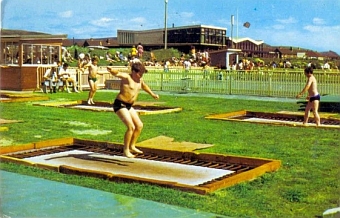 Aberavon beach c1967
Aberavon beach c1967
The boy became a Welsh heavyweight judo champion and a club bouncer, but this didn't seem to help him when he got into a physical fight with his 75 year old next door neighbour. Despite being 32 years younger than his adversary, a Second World War veteran, the older man seems to have got the better of him. According to the local paper the judo champion ended up with a broken finger and bites to his arm. This probably says more about the ferocity of old soldiers than the standard of judo in Wales.
A recent newspaper report says that the boy in the photo is now a campaigner for the right of grandparents to see their grandchildren. A falling out with his daughter has meant that he and his wife have not seen their grandchildren for two years. This is particularly sad because like Ken, myself and probably everyone brought up in Aberavon he ended up with cancer and he has other health problems. After one of his grandparent's rights demonstrations got too lively he was imprisoned for nine hours. He complained to the paper that he wasn't even allowed to keep his walking stick.